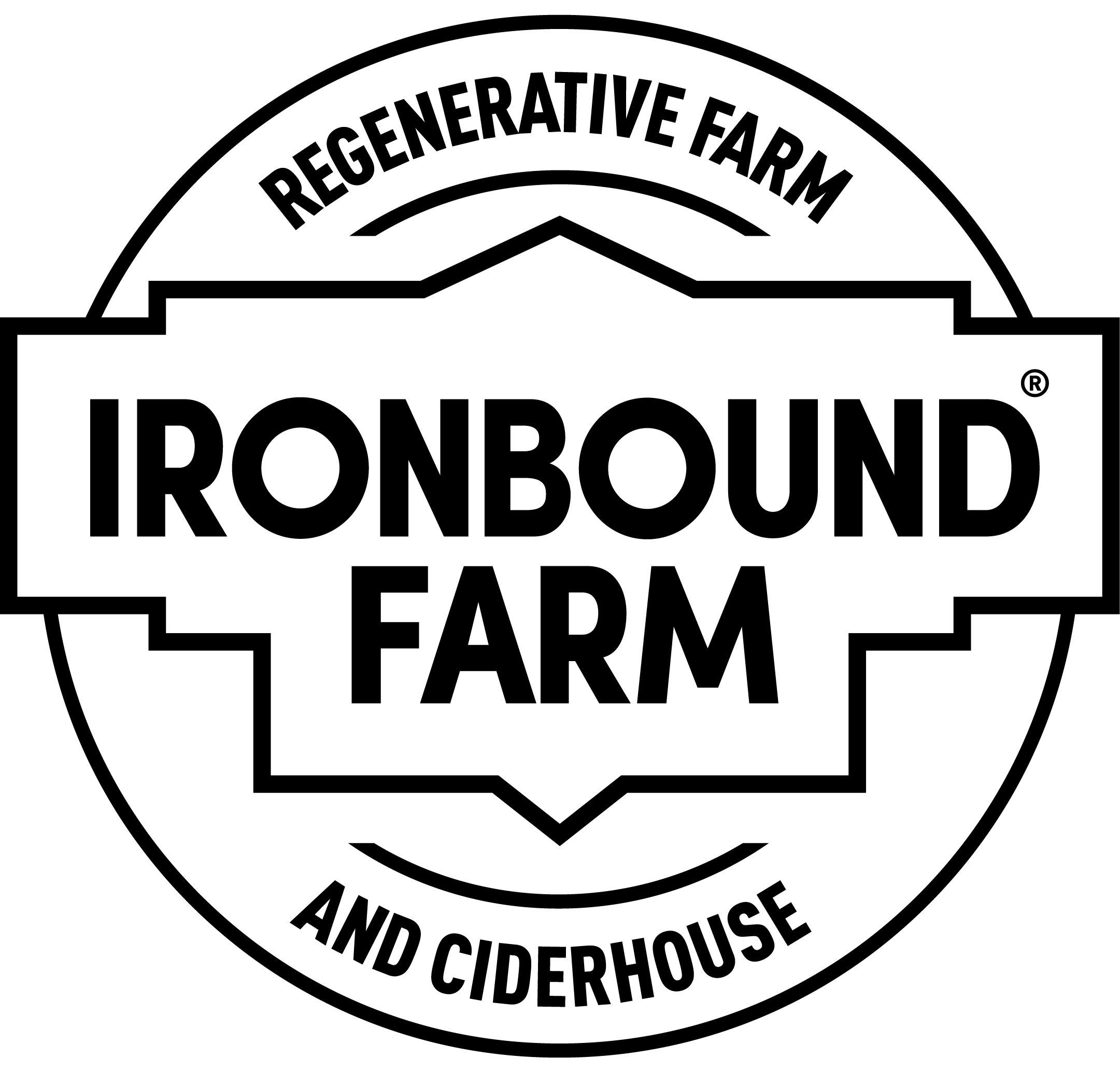AMERICAN-GROWN APPLES MAKE THE FINEST AMERICAN CIDERS
Real cider is complex and balanced — not syrupy sweet like the alcoholic soda that currently dominate the American cider market.
Ironbound Hard Cider creates well-structured, complex ciders from 100% fresh-pressed American apples. We buy our apples from growers in New Jersey and neighboring states — contributing to the success of our local small-scale family farms and to the revitalization of the apple industry in our region. And by planting our orchards with New Jersey's largest collection of historic Newark and New Jersey cider apples, we are helping bring back America's endangered heritage apples.
Consolidation in the apple industry has left a handful of large buyers dictating the types of apples that growers should plant. Those varieties represent just a few of the thousands of American apple varieties that were once available to growers — apples that were beloved by American cider makers, home cooks, and chefs. Markets for American apple growers are further undercut by imported apple concentrate from China and Europe, which is used to make national brands of hard cider and apple juice.
NEWARK’S FAMED CIDER APPLES
In 1817, William Coxe, a New Jersey fruit grower and author of A View of the Cultivation of Fruit Trees — the first book on American apple varieties — identified the Harrison, Canfield, Graniwinkle, and Poveshon as the "four most celebrated Newark ciders." Discovered in the seedling orchards of some of the city's earliest residents, these apples are distinctly and uniquely the product of the people and environment of Newark. They were also the raw material that fueled city's earliest industry — Newark Cider.
Harrison
The Harrison is the most famous, and beloved, of Newark's legendary cider apples. This small yellow apple, with its rough skin and tiny black dots, produces rich, sweet cider that a reviewer in 1803 described this way: "Rich dry taste with a tartness that renders its sweetness agreeable and lively." When, the story goes, Judge Boudinot of Newark presented George Washington with a barrel of Harrison cider, Washington claimed to prefer it over cider made from his own beloved Hewes's Virginia Crab. As for the origin story of this renowned apple, we are again indebted to the Reverend Hillyer. Samuel Harrison told the Reverend that in the early 1700's his father, also Samuel, had gotten a large number of sprouts (which we interpret to mean small grafted whips) from Mr. Osborne, who resided in South Orange. Among those sprouts, Harrison found that fifteen produced the small yellow apple that was first called the Osborne, then the Long Stem, and finally—and forevermore—the Harrison.
LEARN MORE ABOUT THE HARRISON HERITAGE COLLECTION
THE SEARCH FOR THE HARRISON APPLE
IRONBOUND'S REVIVAL OF THE HARRISON APPLE
Canfield
Known also as the Campfield, Camfield, Newark Sweeting, and Sweet Maiden's Blush, Canfield is a rich, sweet, prolific apple that Coxe identified as "the most profitable apple produced in the Eastern counties of this State." Although a mixture of equal portions of Canfield and Harrison was said to make the best Newark cider, apple historian Tom Burford characterizes Canfield's role in cider as being that of "Hamburger Helper." Writing in Scientific American Supplement in 1888, E. Williams proposed a more equal status for the two apples, remembering the then-rare Harrison as Canfield's "old-time consort." The origin of the Canfield was said to be the orchard of either Matthew Canfield, a founder of Newark, or E. Canfield, perhaps referring to Matthew's son, Ebenezer.
Poveshon
This diminutive apple disappeared long ago from New Jersey's orchards and cider mills. While we eagerly await it's rediscovery, we can only experience its flavor and charm through the descriptions left to us by William Coxe and other catalogers of early American apple varieties. The Poveshon, we are told, is a small, deep red apple with rich yellow flesh that is both sweet and uncommonly dry. Sometimes called the Povershon, this apple ripens in late September and was celebrated in Essex County as a fine cider fruit. Coxe believed that the Poveshon was named for an Essex County family who first brought it to notice. We've been working hard to find a Poveshon tree. Keep an eye on our social media channels for updates because, when we finally find this apple, we are definitely going to celebrate!
Graniwinkle
The Graniwinkle is a large, sweet apple that is praised for its rich taste and fine flavor. Also known as the Vanwinkle, Coxe reported that "it is usually mixed with the Harrison for making a cider of superior quality." One early American author also noted that single-varietal cider made from this apple resembles the taste of unfermented metheglin (spiced mead). The origin of the Graniwinkle was a matter of debate back at the turn of the 19th century. The orchard of Thomas Williams was where the Graniwinkle was first found, according to the Reverend Asa Hillyer, pastor of the First Presbyterian Church of Orange from 1801 to 1833. Mr. John Ogden of Newark disputed that claim, saying he heard that the first Graniwinkle graft was taken from a tree belonging to an elderly woman with the delightful name of Mrs. Vanwinkle Poveshon.
Sadly, there is no historical sketch of this apple available.




